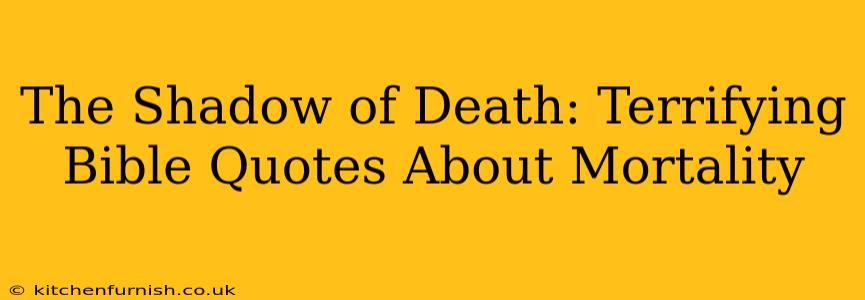The Bible, a book of faith, hope, and salvation, also grapples unflinchingly with the reality of death. While offering comfort and promises of eternal life, numerous passages vividly depict death's power and the chilling shadow it casts over human existence. This exploration delves into some of the most terrifying Bible quotes about mortality, examining their context and the profound impact they have on our understanding of life's fragility. We'll unpack the fear, the awe, and the ultimate message these verses convey.
What Does the Bible Say About the Fear of Death?
The Bible acknowledges the universal fear of death. It's not presented as a sign of weakness but as a natural human response to the unknown. Proverbs 14:32 states, "The wicked are brought down, and are no more: but the house of the righteous shall stand." This verse highlights the stark contrast between the fleeting nature of an ungodly life and the enduring legacy of righteousness, indirectly addressing the fear of oblivion. However, the fear of death isn't simply about non-existence; it often encompasses the unknown, judgment, and separation from loved ones. Many passages directly address this fear, offering solace and hope alongside the stark reality of mortality.
Are There Bible Verses About Dying Young?
While the Bible doesn't explicitly focus on the concept of "dying young" as a separate category, many verses speak to the suddenness and unexpected nature of death, which often affects the young. Ecclesiastes 9:12 reminds us, "For man also knoweth not his time: as the fishes that are taken in an evil net, and as the birds that are caught in the snare; so are the sons of men snared in an evil time, when it falleth suddenly upon them." This verse perfectly captures the unpredictable aspect of death, affecting people regardless of age or circumstance. The suddenness and inevitability highlighted here contribute to the terrifying aspect of mortality, especially when considering a young life cut short.
What Does the Bible Say About the Pain of Death?
The Bible doesn't shy away from depicting the physical and emotional pain associated with death. While focusing primarily on spiritual matters, it acknowledges the suffering involved. Consider the descriptions of battles and plagues in the Old Testament, depicting scenes of widespread death and suffering. The lamentations and mourning expressed throughout Scripture reveal the depth of emotional pain experienced by those left behind. Although not directly describing the process of dying, the biblical accounts of suffering and loss paint a powerful picture of the pain associated with death's impact on those left to grieve.
What are Some Terrifying Bible Verses About Death and Judgment?
Some of the most terrifying biblical passages deal with the concept of judgment after death. Revelations, for instance, contains vivid descriptions of the final judgment and the eternal consequences of actions in this life. While the specific imagery varies across interpretations, the core message remains potent: accountability for one's choices. The imagery of eternal fire and punishment (Matthew 25:41, Revelation 20:15) is often cited as among the most frightening passages, highlighting the severe repercussions of a life unaligned with God's will. These verses, while terrifying to some, serve as a powerful call to reflection and a motivation for seeking a right relationship with God.
How Does the Bible Describe the Shadow of Death?
The "shadow of death" is a recurring metaphor in the Bible, representing the ever-present threat of mortality and the unknown that lies beyond. Psalm 23:4, one of the most well-known verses, states, "Yea, though I walk through the valley of the shadow of death, I will fear no evil: for thou art with me; thy rod and thy staff they comfort me." Here, the "shadow of death" is not presented as purely terrifying but as a journey accompanied by divine protection and comfort. However, the very presence of the "shadow" itself highlights the inherent danger and vulnerability of human existence. Other passages evoke similar imagery, emphasizing the constant proximity of death and the need for faith in the face of mortality's relentless shadow.
Conclusion: Facing Mortality with Faith and Hope
The Bible's portrayal of death is multifaceted. It acknowledges the terror, the pain, and the uncertainty inherent in mortality. Yet, amidst the terrifying imagery, it offers a message of hope, redemption, and eternal life. The terrifying quotes about death, when viewed within the broader context of faith and God's promise, serve not as sources of unending fear, but as powerful reminders of life's preciousness and the ultimate significance of choosing a life aligned with God's will. The "shadow of death," while ever-present, can be walked through with faith, knowing that even in the face of mortality, there is hope beyond the grave.

